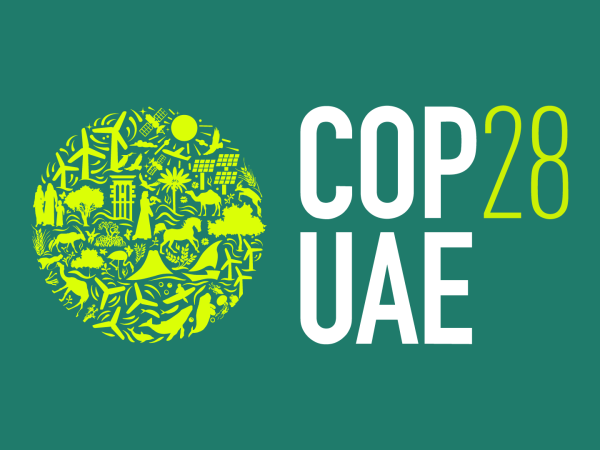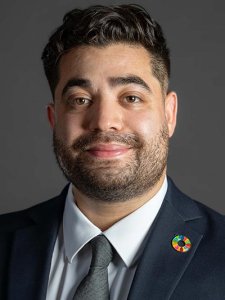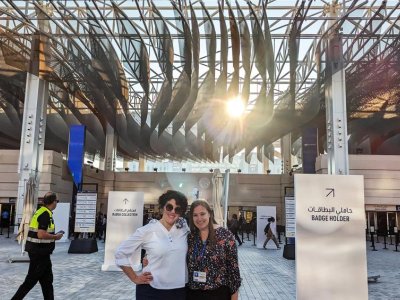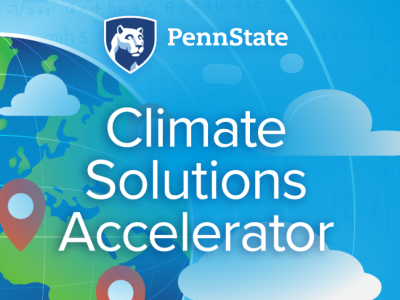
A six-person Penn State delegation will be traveling to Dubai for the United Nations Framework Convention on Climate Change's COP28, which runs from November 30–December 12, 2023. They will be official observers of the meeting, which means that they have the right to speak, make presentations, and engage with governments, NGOs, industry, and the media. They will also be collaborating with other higher education institutions.
The year 2023 is on track to be the warmest year on record. Fires in Hawaii, air pollution from Canadian wildfire smoke, floods in Vermont, and droughts and heatwaves in the Southwest U.S. are helping to show people all over the world that climate change is here now. Yet, continuing demand for fossil fuels makes bending the emissions curve in alignment with the Paris Agreement (limiting the rise in average global temperatures to 1.5 degrees Celsius) increasingly out of reach. In addition to worsening climate impacts, a warmer climate compounds energy injustice and threatens energy security. On the bright side, recent surveys show that beliefs and attitudes about climate change are changing, with about 75% of Americans believing that climate change is happening and only 15% who think it is not. The question now is, what are we going to do about it?
The UNFCCC (United Nations Framework Convention on Climate Change) convenes meetings called COP (Conferences of the Parties) events among leading governmental institutions to negotiate plans to address climate change. The 28th of such meetings will occur in Dubai, United Arab Emirates (UAE), in early December. The outcomes of these meetings will determine whether there is enough political will to take meaningful steps towards mitigating the worst impacts of climate change.
A group of faculty and students from Penn State are traveling as official observers of COP28. Additionally, we will be collaborating with other higher education institutions on dialogue for meaningful action. Here are some of the things we are going to watch for:
Is the world on track to meet the Paris Agreement targets?
As mandated by the Paris Agreement, countries will take stock of current progress towards emissions reduction goals as part of a Global Stocktake, which is a global inventory that identifies climate action implementation and evaluates the progress made in achieving the targeted goals. However, recent reports by the Intergovernmental Panel on Climate Change released last year clearly showed the world is off track towards meeting the Paris Agreement targets, so there is a strong interest in seeing how this Global Stocktake can provide value. In the best-case scenario, the Global Stocktake could help re-align global priorities around climate ambition.
How do fossil fuel companies figure into the equation?
To convene a climate change conference in the middle of one of the largest oil-producing regions in the world is surprising and alarming to many. Continued sales of fossil fuels seem to contradict private sector commitments to energy transition to renewables. A key question remains: Will companies be serious partners to help scale solutions to meet energy demands in ways that are carbon-friendly, socially responsible, and sustainable?
Will the high-emitting, wealthier countries pay up?
Last year, some of the wealthiest countries in the world agreed to pay for the damage caused by climate change to the most vulnerable countries. However, the mechanisms to do so, and the ways in which these payments will be certified and verified, remain work in progress. Establishing a facility to coordinate these payments would be a great outcome of COP28.
Will the private industry and business sector engage?
Achieving net-zero is an ambitious goal that cannot be realized without the private sector’s substantial involvement and commitment to sustainable practices. Recognizing this, the organizers of COP28, in collaboration with entities like the chambers of commerce from both the U.S. and UAE, have made concerted efforts to involve industry and business decision-makers in the heart of climate discussions. In particular, climate finance, including private and corporate capital, has been poised for years to address the climate crisis, but investments have paled in comparison to the need, leaving many local communities struggling to adapt and reducing the scalability of decarbonization innovations. Engaging business sectors to collaborate on carbon-friendly, socially responsible, and sustainable solutions will be an important theme at this meeting.
Will countries consider carbon strategies for the ocean?
While carbon management on land has received lots of attention in past COPs, the focus this year might very well be on the ocean. The ocean has absorbed a significant amount of heat caused by past fossil fuel emissions, buffering some of the worst effects of climate change. New strategies are being proposed to support healthy ocean and coastal systems, reduce more of the carbon from the atmosphere, and support communities that depend on mangroves, seagrasses, and kelp forest ecosystems.
What is the role of children and young people in climate decision-making?
One of the hallmarks of António Guterres’ tenure as United Nations Secretary General has been an increasing recognition of children and young people as critical and equal partners in sustainable development. In the last half decade, frameworks like Youth2030 have contributed to mainstreaming practices of meaningful youth engagement across sustainable development decision-making and the U.N. system. The significance of children and young people’s perspectives has long been central to the U.N. climate process. Young people have had a formal constituency—YOUNGO—since the 2009 negotiations. And in recent years, the growth of movements such as “Fridays for Future” have prompted policymakers to recognize the urgency of intergenerational justice and youth involvement.
To its credit, the COP28 team is developing programs such as the International Youth Climate Delegate Program that will support the attendance of 100 youth with an emphasis on young people from Least Developed Countries, Small Island Developing States, Indigenous youth, and other groups often left out of international climate policy. Several countries like Tunisia and Iraq are actively involving young people in their national delegations to COP and building youth capacity to engage meaningfully in decision-making. COP28 will also be the second COP to feature a dedicated “Children and Youth Pavilion,” a gathering place for youth advocates and a space for events focused on children and young people’s work. Still, there is work to be done, specifically in elevating and amplifying the perspectives, lived experiences, and involvement of children and young people from communities and regions most impacted by climate change. Branded as the “most inclusive UN climate change conference to date,” it will be critical to see how COP28 elevates the meaningful engagement of children and young people in a policy process which shapes their presents and futures and to attend to what lessons can be drawn for other policy processes.
As observing members of the COP28 process representing higher education institutions, we will be particularly watching for ways in which universities can be part of the solution, through our operations, education, research, and outreach activities. Universities are, at their core, intergenerational institutions, making them critical places to engage in youth-centered climate education and action. They are also meaningful contributors to interdisciplinary innovation that can propel societal transformation. Deepened partnerships across higher education institutions in these shared goals would be an important outcome of COP28.
To learn more about the COP28 meeting, you can visit the COP28 website which has details about the events and negotiations and follow along through the TV live stream.
The Penn State delegation is made up of Olivia McMahon, Undergraduate Student, World Campus; Esther Obonyo, Associate Professor, School of Engineering Design and Innovation; Mark Ortiz, Presidential Postdoctoral Scholar, Department of Geography; Brandi Robinson, Assistant Teaching Professor, College of Earth and Mineral Sciences; Vikrant Sapkota, Graduate Student, Meteorology; Erica Smithwick, Distinguished Professor of Geography.








